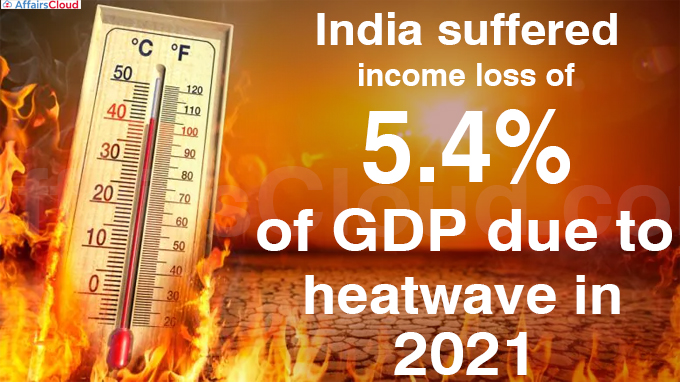
As per the 7th Lancet Report of ‘Lancet Countdown on health and climate change: health at the mercy of fossil fuels‘, India suffered loss of 167.2 billion potential labour hours in 2021 due to heat waves which resulted in income loss equal to 5.4% of India’s GDP (Gross Domestic Product), the highest among the G20 nations in 2021.
- India faced 55% increase in deaths due to extreme heat between 2000-2004 and 2017-2021.
- Climate change is a key factor in a rising heatwave in India. It occurred 30 times more because of this scenario.
Assessment:
The report is an international, transdisciplinary collaboration of 51 academic institutions and UN (United Nations) agencies, monitoring the changing health profile of climate change
The assessment is based upon the 43 indicators for 103 countries.
Global Scenario:
i.On the global front, heat-related deaths have increased by 68% between 2000–04 and 2017–21.
ii.Heat exposure led to 470 billion potential labour hours loss in 2021 with potential income losses equivalent to 0.72% of the global economic output.
- This loss is 5.6% of the GDP in low Human Development Index (HDI) countries.
iii.There is also a threat on crop yields as the growth seasons of maize are on average 9 days shorter in 2020, and the growth seasons of winter wheat and spring wheat 6 days shorter than for 1981–2010 globally.
iv.Extreme weather events caused damage worth US$253 billion in 2021.
- It worsens the stability of global food systems as 98 million more people reported moderate to severe food insecurity in 2020 than annually in 1981–2010.
v.Because of the rapidly increasing temperatures, vulnerable populations (adults older than 65 years, and children younger than one year of age) were exposed to 3.7 billion more heatwave days in 2021 than annually in 1986–2005.
vi.The United States (US) had the most emissions per person.
Indian Scenario:
i.Some Indian geographical areas receive heat waves during the whole year, while summers have become unbearable in many parts.
ii.The burning of fossil fuel has led to more than three lakh thirty thousand deaths in India in 2021. These deaths are mainly the result of exposure to particulate matter-tiny particles that can clog the lungs.
iii.The dependence on fossil fuels like oil, natural gas, and biomass increased average household concentrations of particulate matter. This has surpassed the set recommended limit in India by the World Health Organisation (WHO) by 27-fold.
Key Points:
i.Notably, without climate change, extreme temperatures would occur once every 312 years.
ii.Exposure to extreme heat affects health directly, exacerbating underlying conditions such as cardiovascular and respiratory disease, and causing heat stroke, adverse pregnancy outcomes, worsened sleep patterns, poor mental health, and increased injury-related death. Click Here for Official Report
Recent Related News:
i.India adds a record breaking 7.2 gigawatt (GW) of solar installations in the first half of 2022, as per the report released by Mercom India Research. Large-scale solar accounted for 90% of the installations, and rooftop accounted for the remaining 10% during the reporting period (2022).
ii.According to 13th edition of Global Wealth Report 2022 by Credit Suisse,a Switzerland-based investment bank and financial services firm, India witnessed a 12 percent year-on-year (YoY) growth in total household wealth in FY21.The report also estimates that global wealth totaled USD 463.6 trillion at the end of 2021, a rise of USD 41.4 trillion (9.8%).
About The Lancet:
Editor-in-Chief– Richard Horton
Headquarter– London, United Kingdom (UK)